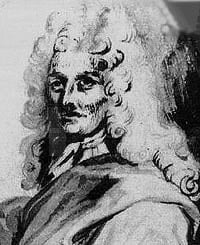William Paterson (banker)
Sir William Paterson (born April, 1658 in Tinwald, Dumfries and Galloway, Scotland - died in Westminster, London, on January 22, 1719) was a Scottish trader and banker.
Early life
William Paterson was born in his parent's farmhouse of Skipmyre in Tinwald, Scotland, and lived with them until he was seventeen, when he emigrated first (briefly) to Bristol and then to the Bahamas. It was here that he first conceived the Darién scheme, his plan to create a colony on the isthmus of Panama, faciliating trade with the Far East.
Career
Paterson returned to Europe, and attempted to convince the English government under James II to undertake the Darién scheme. When they refused, he tried again to persuade the governments of the Holy Roman Empire and the Dutch Republic to establish a colony in Panama, but failed in both cases.
Paterson returned to London and made his fortune with foreign trade (primarily with the West Indies) in the Merchant Taylors' Company. While there, he founded the Bank of England in 1694 to act as the English government's banker. He proposed a loan of £1.2m to the government; in return the subscribers would be incorporated as The Governor and Company of the Bank of England with banking privileges including the issue of notes. The Royal Charter was granted on July 27, 1694.
Paterson relocated to Edinburgh, where he was able to convince the Scottish government to undertake the Darién scheme, and was influential in the establishment of the Bank of Scotland (1695), the central bank of the Kingdom of Scotland. Paterson accompanied the disastrous Scottish expedition to Panama (1698), where his wife and child died and he became seriously ill. [1] On his return to Scotland in December 1699, he became instrumental in the movement for the Union of Scotland and England, culminating in his support of the Act of Union 1707. He spent the last years of his life in Westminster, and died in January 1719.
Chief works
Roughly 22 anonymous works are attributed to Paterson, notably:
- Proposals and Reasons for Constitulating a Council of Trade (1701), a plan to create a Scottish council of Trade which would stimulate the Scottish economy and trade, partly by abolishing export duties.
- A Proposal to plant a Colony in Darién to protect the Indians against Spain, and to open the Trade of South America to all Nations (1701), a broader version of the Darién scheme intended to bring free trade to all of Central and South America.
- Wednesday Club Dialogues upon the Union (1706), a series of imaginary dialogues in which Paterson expressed his beliefs that Scotland had to be guaranteed equal taxation, freedom of trade and proportionate representation in Parliament if union with England was to succeed.
Quotes
"The bank hath benefit of interest on all moneys which it creates out of nothing."
See also
- John Holland, founder of the Bank of Scotland
- Saxe Bannister
- Daniel Defoe
- Acts of Union 1707
- Darién scheme
he was 35 at the time
External links
- Famous Americans - William Paterson
- Great Scotsmen - William Paterson
- Famous Scots - William Paterson
Credits
New World Encyclopedia writers and editors rewrote and completed the Wikipedia article in accordance with New World Encyclopedia standards. This article abides by terms of the Creative Commons CC-by-sa 3.0 License (CC-by-sa), which may be used and disseminated with proper attribution. Credit is due under the terms of this license that can reference both the New World Encyclopedia contributors and the selfless volunteer contributors of the Wikimedia Foundation. To cite this article click here for a list of acceptable citing formats.The history of earlier contributions by wikipedians is accessible to researchers here:
The history of this article since it was imported to New World Encyclopedia:
Note: Some restrictions may apply to use of individual images which are separately licensed.
- ↑ Dennis R. Hidalgo To Get Rich for Our Homeland: The Company of Scotland and the Colonization of the Darién, Colonial Latin American Historical Review, 10:3 (Summer/Verano 2001): 156
